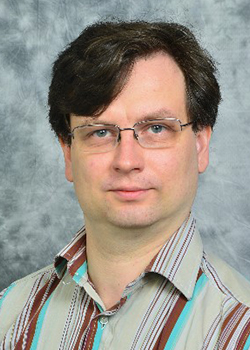Nechaev Lab Manuscript Accepted in Nature Communications
 The laboratory of Sergei Necahev, an Associate Professor with the Biomedical Sciences
Department at the University of North Dakota School of Medicine & Health Sciences,
has a recent publication accepted by Nature Communications. This prestigious journal
has a current impact factor of 16.6 with a total of 675,323 citations. The title of
the manuscript is, "Transcriptional Responses of Cancer Cells to Heat Shock-Inducing Stimuli Involve
Amplification of Robust HSF1 Binding."
The laboratory of Sergei Necahev, an Associate Professor with the Biomedical Sciences
Department at the University of North Dakota School of Medicine & Health Sciences,
has a recent publication accepted by Nature Communications. This prestigious journal
has a current impact factor of 16.6 with a total of 675,323 citations. The title of
the manuscript is, "Transcriptional Responses of Cancer Cells to Heat Shock-Inducing Stimuli Involve
Amplification of Robust HSF1 Binding."
According to Dr. Nechaev, "Our environment is well known to affect the odds of getting diseases including cancer. However, how chemical stresses and toxins affect us remains poorly understood. A study led by Dr. Sergei Nechaev, a faculty at the Department of Biomedical Sciences, and a Ph.D. student Sayantani Ghosh Dastidar in his lab set out to compare how cancer cells respond to stimuli at the molecular level. They chose to examine the activation of Heat Shock Response signaling pathway, an important hallmark of aging and cancer. By performing deep-dive comparisons of gene expression in different cancer cell types responding to distinct stimuli, Dastidar et al found that the transcription factor protein called Heat Shock Factor 1 (HSF1) shapes gene expression in a cell type-specific manner. The work found that HSF1 changes not only genes, which was previously known, but also alters remote regions of the human genome, potentially predisposing these previously inactive regions of our genome for epigenetic reprogramming. The work, recently published in the journal Nature Communications, should help scientists learn how short-term exposures to chemical stresses cause long term changes in our epigenome to ultimately gain a better grasp at predicting how drug treatments would affect different cancers based on their molecular signatures."
In addition to Dr. Nechaev, this publication has 9 other authors with afilliation to the Biomedical Sciences Department at UND: Sayatani Ghosh Dastidar, Bony De Kumar, Bo Lackner, Damien Parrello, Danielle Perley, Maria Vlasenok, Antariksh Tyago, Nii Koney-Kwaku Koney, and Ata Abbas.
Link to publication: https://www.nature.com/articles/s41467-023-43157-7